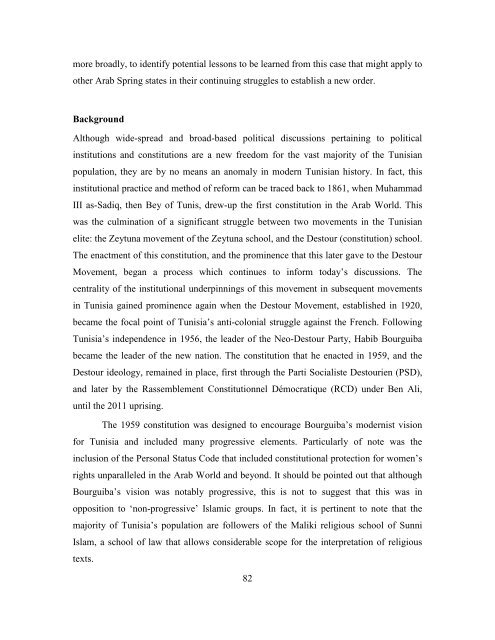Tunisia: Understanding Conflict 2012 - Johns Hopkins School of ...
Tunisia: Understanding Conflict 2012 - Johns Hopkins School of ...
Tunisia: Understanding Conflict 2012 - Johns Hopkins School of ...
You also want an ePaper? Increase the reach of your titles
YUMPU automatically turns print PDFs into web optimized ePapers that Google loves.
more broadly, to identify potential lessons to be learned from this case that might apply to<br />
other Arab Spring states in their continuing struggles to establish a new order.<br />
Background<br />
Although wide-spread and broad-based political discussions pertaining to political<br />
institutions and constitutions are a new freedom for the vast majority <strong>of</strong> the <strong>Tunisia</strong>n<br />
population, they are by no means an anomaly in modern <strong>Tunisia</strong>n history. In fact, this<br />
institutional practice and method <strong>of</strong> reform can be traced back to 1861, when Muhammad<br />
III as-Sadiq, then Bey <strong>of</strong> Tunis, drew-up the first constitution in the Arab World. This<br />
was the culmination <strong>of</strong> a significant struggle between two movements in the <strong>Tunisia</strong>n<br />
elite: the Zeytuna movement <strong>of</strong> the Zeytuna school, and the Destour (constitution) school.<br />
The enactment <strong>of</strong> this constitution, and the prominence that this later gave to the Destour<br />
Movement, began a process which continues to inform today’s discussions. The<br />
centrality <strong>of</strong> the institutional underpinnings <strong>of</strong> this movement in subsequent movements<br />
in <strong>Tunisia</strong> gained prominence again when the Destour Movement, established in 1920,<br />
became the focal point <strong>of</strong> <strong>Tunisia</strong>’s anti-colonial struggle against the French. Following<br />
<strong>Tunisia</strong>’s independence in 1956, the leader <strong>of</strong> the Neo-Destour Party, Habib Bourguiba<br />
became the leader <strong>of</strong> the new nation. The constitution that he enacted in 1959, and the<br />
Destour ideology, remained in place, first through the Parti Socialiste Destourien (PSD),<br />
and later by the Rassemblement Constitutionnel Démocratique (RCD) under Ben Ali,<br />
until the 2011 uprising.<br />
The 1959 constitution was designed to encourage Bourguiba’s modernist vision<br />
for <strong>Tunisia</strong> and included many progressive elements. Particularly <strong>of</strong> note was the<br />
inclusion <strong>of</strong> the Personal Status Code that included constitutional protection for women’s<br />
rights unparalleled in the Arab World and beyond. It should be pointed out that although<br />
Bourguiba’s vision was notably progressive, this is not to suggest that this was in<br />
opposition to ‘non-progressive’ Islamic groups. In fact, it is pertinent to note that the<br />
majority <strong>of</strong> <strong>Tunisia</strong>’s population are followers <strong>of</strong> the Maliki religious school <strong>of</strong> Sunni<br />
Islam, a school <strong>of</strong> law that allows considerable scope for the interpretation <strong>of</strong> religious<br />
texts.<br />
82
















